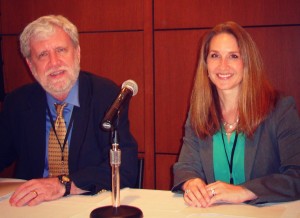[vc_column_text pb_margin_bottom=”no” pb_border_bottom=”no” width=”1/1″ el_position=”first last”]
“Good artists copy but great artists steal” – Picasso
Last week, I had the enormous pleasure of being a keynote speaker at a simulation symposium in Kansas City alongside the very famous Anders Ericsson. If you don’t think you know him, think again. He’s the brains behind the research that is very widely quoted (and misquoted) in the laypress by popular authors such as Malcolm Gladwell’s Outliers.
[/vc_column_text] [vc_column_text pb_margin_bottom=”no” pb_border_bottom=”no” width=”1/1″ el_position=”first last”]
Dr. Ericsson is the Conradi Eminent Scholar and Professor of Psychology at Florida State University, and is widely recognized as one of the world's leading theoretical and experimental researchers on expertise. He’s been conducting research on expertise and decision making literally longer than I have been alive – more than four decades. I was honored to share the stage with him, and also delighted that our hosts arranged for him to autograph a paper for me!
[/vc_column_text] [vc_column_text pb_margin_bottom=”no” pb_border_bottom=”no” width=”1/1″ el_position=”first last”]
Although Dr. Ericsson is not an expert on medical education or medical simulation or even medical decision making per se, because he is the expert on deliberate practice and acquisition of expertise across many domains, we can learn a lot from his research and ideas.
The most important thing I believe we can apply to medical education is the following:
Experience alone does not lead to expertise
[/vc_column_text] [vc_column_text pb_margin_bottom=”no” pb_border_bottom=”no” width=”1/1″ el_position=”first last”]
Cumulative experience, just by showing up to work (or playing soccer or the violin) does not make one acquire expertise, and is certainly the longest path to achieving gains of any kind. Deliberate practice – the careful selection of a task that is both challenging but not too hard, selected by a coach, and then practiced in a deliberate and effortful way with immediate feedback by that coach until it is mastered – is the key to achieving expertise.
In medicine, however, we learn “on the job” by teachers who may not be true experts themselves. We read and use internet resources, of course, and we are lucky to get a lecture series that attempts to make our curriculum comprehensive and orderly. However, we experience only what happens to present itself in our clinics, wards, ERs, and ORs. This is random both in terms of disease and patient assortment, and the order in which we encounter the experiences. There is no deliberate and logical building of skill, although we do have some sequential increases in autonomy and judgment. (Fortunately, the technique of instruction via simulation does lend itself to this kind of deliberate practice, but then we face the challenges of time and resources to invest in the training. There is also the ever-present argument that somehow simulation is inferior to “practicing” on a real patient, which of course must be balanced with the public desire to be protected from being “practiced on” by learners.)
How then can we achieve expertise in medicine? This is as-of-yet undefined. However, one thing is clear. Modern medicine, with the enormity of modern data and breadth of modern knowledge, is in desperate need of innovative, creative, imaginative ways to incorporate true expert coaches, deliberate practice, and immediate feedback into medical training.
Have you successfully implemented a deliberate practice paradigm in your training institution? Tell me about it.
[/vc_column_text]









